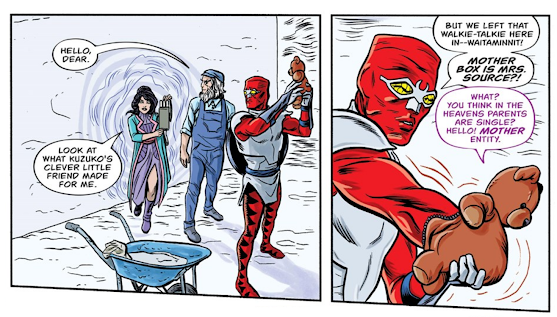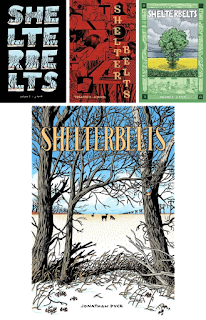I hate disappointing Octobers. I had a long list of unseen films I wanted to check off this Halloween season but, as you will see, not a lot of depth here.
Dang.
Hope you crammed more in than I did!
 |
| HOME library dvd |
Sure it's a bit obvious and yeah we can never know what it would be like to enter it without any idea of what it was about, but it's still a cool concept and an enjoyable film. I suppose you could say it as an emnight twist, but some explanation was always going to be forthcoming. Really, it's all very calm and upfront as to what it's about. Outside the controlling conceit, there's no real gimmick. Plenty of flash (maybe too much) but it's a very utilitarian ride. Fun, but I don't know that it'll be one we're still talking about in ten years. See you then (so long as we stay off the beaches)!
 |
| HOME Disney+ |
I cannot believe that it is October 11th and not only is this only the second Halloween-adjacent film I have seen, it's only the second film period. Disgusting.
But two movies starring Gael García Bernal means I get to have an opinion on him now and I think he's pretty good.
I appreciated that Marvel's going for an old Universal vibe here. It only catches it off and on, but some of those ons are terrific.
This might be the first MCU thing I've seen in which I hadn't even heard of the character before seeing the titular piece of entertainment. So with no preconceptions, how was it? Okay. It was fun, shockingly gory (because b&w makes it okay??), and had a couple of moments. I liked that it wasn't trying to be any bigger than what it is. So all in all, a success. But not likely to prove memorable. But I wager we'll see this guy again with . . . Blade? Black Knight? Moon Knight? Time will tell.
I will say that the Swamp Thing knockoff* was better rendered than She-Hulk which seems insulting, to be honest.
*(Ah. It's Man-Thing. I've heard of him.)
 |
| ELSEWHERE library dvd |
I completely agree with my first viewing on every point, even its predictions that it would be ever better this time. It was.
I showed it to my AP Lit classes as a capstone for reading another Austen and it was hard to tell if they were into it at all until Box Hill when they all gasped in horror. No doubts after that as I heard them react audibly to every emotional beat the rest of the way.
Meanwhile, there's Mr Jepson, just weeping at the slightest provocation all the way through the third act.
 |
| HOME library dvd |
Suck a peculiar film. One part Vertigo to a half part each of That Darn Cat and The Cat from Outer Space. And just as weird as that sounds. Without being quite as solid as any of them.
I finally decided I had to see this movie when I learned it came out the VERY SAME YEAR as Vertigo—and stars, like Vertigo, James Steward and Kim Novak. And swapping San Francisco for New York doesn't solve the problem. It's the same era. They are the same actors. Some of the lighting and shots echo. And then Jimmy's secretary has almost the same hairdo and suit Kim did in the other film! It's disorienting.
And is it a creepy movie or a funny movie? Is it romantic or abusive? It's really hard to tell. Part of that is due to the metaphors trying to push through the skin like an unruly skeleton, but it's just not quite coherent tonally or thematically.
I wish a braver director had been at the helm. Richard Quine has some exciting images and good ideas but lacked the ability to make the whole thing stick together. Even Elsa Lanchester seems not quite sure which way to go and she's Elsa Lanchester! Her very presence should make this thing sing!
 |
| ELSEWHERE our dvd |
Still enjoy this movie immensely. I get why Harold Bloom complains that Tuscany is a bigger star than Shakespeare, but I disagree.
I know Shakespeare doesn't care, but I he did leave a couple of arguable plot holes, for instance, how did Claudio know about Benedick's poetry? Speaking of Claudio, my experience was most different this time in that I had much less sympathy for him. He's kind of a golddigging misogynist lightly papered over with infatuation, isn't he?
In terms of actors, Keanu is better than people give him credit for and Kate looked so much different when she was nineteen. It can's just be her plucked eyebrows, can it? Plus, I always get sad seeing Kenneth and Emma so great together knowing where their personal histories would lead. And, speaking of Emma, whom even Harold Bloom lauds, isn't she great? Just terrific. In absolutely everything. Maybe the best we've got.
 |
| ELSEWHERE due to complications, a mix of our dvd Freevee and Soap2day |
I've been wanting to watch this for ten years. And now I've finally seen it. Twice, no less! And . . . I dunno. It has some truly excellent points. Some of my favorite bits (eg, the watch looking at each other) are barely connected to Shakespeare's words. And not all the actors really succeed at their parts. Benedict, for instance, can do physical comedy but not comedic delivery. They kept some badly aged stuff from the play for intentional effect (Claudio's Ethiope reference) and other they kept without them making much sense. The modern setting was mostly fine but it was hard to get a firm grasp on just what the rules of this modernish world are. For instance, Agent Coulson's choices as the plot is revealed to him (he plays Leonato) are terrific. But then he has to give Claudio his niece and although his delivery is fine, the plot just turns to nonsense before our faces. And since the whole thing takes place in one house, it's perplexing how some information remains unknown for a full day. Little things like that mean that great performances from Claudio and Beatrice (and what seems like a Claire Danes impression from Garfunkel) get interrupted by bits of script and linereadings that appeared to need a bit more time before being camera-ready
In short, a pretty good adaptation but not as good as 1993's. Perhaps Harold Bloom would have loved it.
 |
| ELSEWHERE Prime Video |
So apparently it is possible to watch some movies too many times, and I've just hit that point with Bucket of Blood. Although I chuckled at moments, it's just a little too dumb to watch this many times.
Then again....
MAYBE I JUST NEED TO WATCH IT TEN MORE TIMES TO BRING IT BACK TO LIFE!
.png)











